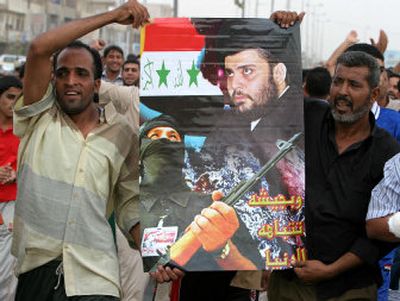23 Iraqi police killed; Sunni VP rethinks post

BAGHDAD, Iraq – Suspected Sunni Arab gunmen killed 23 policemen Sunday, including 17 in one attack in the predominantly Shiite southern city of Basra, signaling the possible start of an intensified insurgent campaign against Iraq’s predominantly Shiite Muslim security forces.
Political tension deepened in Baghdad when Vice President Tariq al-Hashemi, the country’s highest-ranking Sunni politician, threatened to resign if Prime Minister Nouri al-Maliki did not act quickly to eradicate two feared Shiite militias.
Al-Maliki, a Shiite, depends heavily on the backing of the two Shiite political parties that run the militias and has resisted American pressure to eradicate the private armies – the Mahdi Army of radical cleric Muqtada al-Sadr and the Badr Brigade, the military wing of Iraq’s biggest Shiite political bloc, the Supreme Council for the Islamic Revolution in Iraq.
Shiite gunmen, especially those of the Mahdi Army, are deeply involved in the sectarian killings that have brutalized Baghdad and central Iraq for months.
Police have been targeted throughout the insurgency in an effort to destabilize the U.S.-supported government, but Sunday saw a sharp step-up in attacks aimed at security services.
The surge in violence also comes amid U.S. efforts to bring Sunni insurgents into a reconciliation process and a public squabble with al-Maliki over a timeline for crushing the Shiite militias and moving forward with measures to soothe the disaffected Sunni minority.
Thirty-three people in all were slain across Iraq on Sunday in a second day of rising violence that ended a five-day lull in attacks after the end of Muslims’ holy month of Ramadan.
Officials also found 24 bodies, some of them decapitated, the latest victims of sectarian reprisal killings that have soared since Sunni bombers destroyed a Shiite shrine in Samarra, north of the capital, Feb. 22.
Until that attack, the Sunni Arab insurgency was responsible for nearly all the violence in Iraq, both in attacks on American troops and the use of huge bombs aimed at Shiite civilians.
Since Shiite militias and roaming death squads joined the fight, thousands of Iraqis have been tortured and killed on both sides of the sectarian divide, taking Baghdad and other mixed Shiite-Sunni regions in the center of the country to the brink of civil war.
In Basra on Sunday, gunmen dragged 15 policemen and two translators – instructors at the police academy – off a bus at the edge of town. Their bodies were found dumped throughout the city beginning about four hours later.
Fourteen of the victims were Shiite, three were Sunni. Shiites are about 80 percent of the population in Basra, Iraq’s second-largest city.
Anger over the destabilizing violence brought a political tremor when the top aide to al-Hashemi, the vice president, said his boss has threatened to resign unless the government quells the Shiite militias.
“Yes, the vice president is threatening to quit. Our position dictates that we send a message to the government. We cannot live with this situation indefinitely,” said Mohammed Shaker.
Losing al-Hashemi, the country’s top-ranked Sunni politician, would be a blow for the already shaky al-Maliki government.